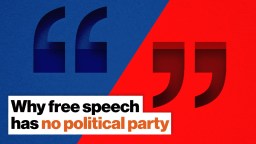NADINE STROSSEN: Social media platforms present the same issues that we have been grappling with with respect to older media. But throughout human history every time a new medium of communication comes along many people, including many government officials, become very exercised about the new power and the allegedly new harms that are posed. So, we went through this when radio was invented, when the telephone was invented, when television was invented, when the World Wide Web came to people's attention. And, in fact, I have read that when the printing press was invented and when papyrus was invented there were similar eruptions of fear about this great new power to distribute information and the harm that could be done through information and disinformation. So, I think it's really important for us to have historic humility and not see what we're going through now as inherently different and more dangerous than the past. And I think that the same fundamental principles that have applied to other media should apply to social media as well.
First of all, as private sector entities, social media companies have absolutely no legal obligation to respect First Amendment rights, free speech rights, for anybody else. So, just as I have no right to participate in your wonderful film and I have no right to have an op-ed in The New York Times, I have no right to have my post displayed on Facebook or Twitter and so forth. Moreover, those companies have their own First Amendment rights to make their own editorial decisions about what expression they are going to allow on their platform and what they're not going to allow. I, as somebody who defends free speech rights for media companies, along with other companies, would oppose government restriction on the ability of these companies to decide what they will air and what they will not air. However, I will raise my voice to urge these companies to adhere, as closely as feasible, to the same basic standards that are reflected in the First Amendment. Because I think that for all of the potential damage that can be done by various kinds of online communications, including disinformation and so-called fake news and political ads and so forth, that far more harm is done when we empower these largely unaccountable private sector really powerful entities to pick and choose what expression is going to be aired and what will not be aired. And that danger is especially great when we are talking about political speech. The supreme court has consistently said, throughout history, of all expression that is important in our system of government by far the most important is speech about public affairs, speech about politics. "We, the people," to quote the opening words of our constitution, we wield sovereign power but how can we do that responsibly or effectively if we do not have access, full access, to information about those who are running for office? Those who are seeking our votes? Those who are making public policy decisions?
Most of the time when people advocate censorship, beyond the emergency situation in which First Amendment law allows speech to be censored, most of the time people talk about the harm that speech can cause, whether it be disinformation/fake news or whether it be hate speech or whether it be terrorist content. And I agree, speech does have an enormous capacity to do harm as well as an enormous capacity to do good. We protect it precisely because it is so powerful. But the argument, 99.9 percent of the time, starts and ends with the potential harm of free speech. Those who advocate censorship never examine whether censorship is going to be effective in addressing, redressing, reducing the harm. They never address whether censorship, to the contrary, is going to do more harm than good. And in every situation that I'm aware of, censorship actually ends up being ineffective in addressing the harms at stake, at best, or counterproductive at worst. So, disinformation: Well, are we going to say that empowering Mark Zuckerberg and the other titans of Silicon Valley to decide that certain speech is untrue—is that actually going to solve our political problems? I think to the contrary, that is as threatening to democracy as it is to individual freedom.
Likewise, with respect to so-called hate speech that conveys discriminatory ideas against traditionally marginalized or excluded groups, every hate speech law around the world to this day is disproportionately enforced consistently against the very minority groups who are hoped to be protected. And we shouldn't be surprised at that. Once you have these discretionary standards what is hate speech? What is disinformation? No two individuals can agree on such inherently subjective concepts and so by definition those who wield power are going to wield their discretion in ways that predictably are going to perpetuate their power and not empower those who have traditionally been silenced or marginalized.







